BANGLADESH: Providing eye care services to the poor
Lack of eye care provision in rural Bangladesh leaves many in the dar
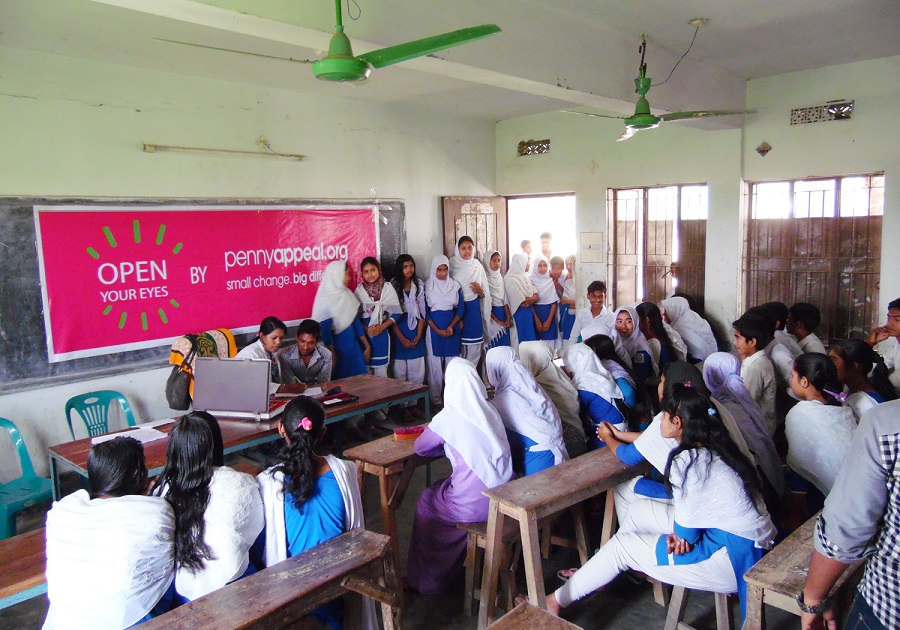
Bangladesh has a profound problem, many of its people have no immediate - or indeed – any access to even rudimentary eye care. Per percentage of population, Bangladesh has one of the highest rates of people suffering from blindness.
The extensive nature of this issue reflects tangibly in figures released by the Bangladesh National Blindness and Low Vision Survey, from 2003, with figures thought to have increased considerably since this report. There are around 750,000 adults and 40,000 children in Bangladesh who are blind from cataracts or other easily treatable ocular diseases. There are simple treatments for these ailments that we take for granted in the Western world; the real tragedy is that for the blind people of Bangladesh there is often a cure.
Quite simply, the need for outreach and awareness programmes in Bangladesh, in regards to eye care – particularly in rural areas – is immediately apparent. The need arises form a perfect storm of underlying issues, that chime together to ravage the eye-health of an estimated 4.6 million (uncorrected refractive error) people living in abject poverty, 1.3 million of these, rather worryingly - are children.
This perfect storm is created through three elements, the first is unsurprisingly the abject poverty in which many people in Bangladesh live within, especially in rural areas – that with poor infrastructure and a lack of funding - are made innately hard to reach. The second intertwines naturally with the first, geographical location. And finally the third manifests itself as unavailable services, as most of the top eye care provision in the country are located well within established urban areas, ergo Bangladesh’s main cities, such as Dhaka and Chittagong. Tying together these three elements, is one simple statistic, 80% of Bangladeshis who live in rural areas are nigh on completely deprived of any eye care provision.
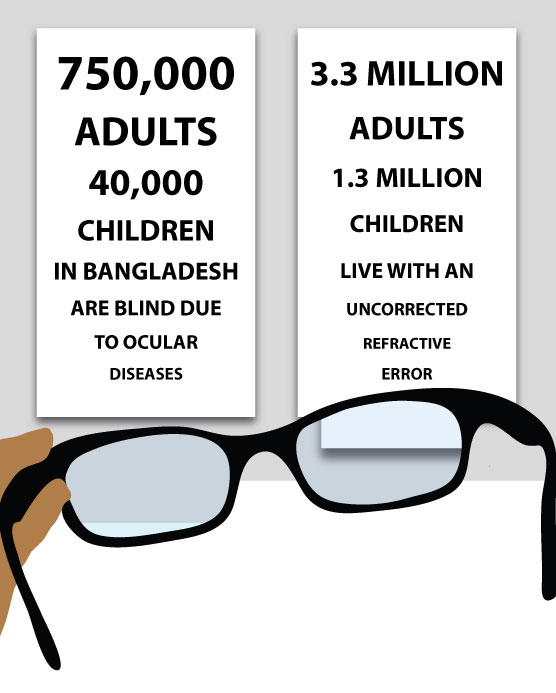
As a result of this problem, Bangladesh is one of the highest disease burden countries in the world for ocular morbidity, with remarkably low cataract surgery rates (CSR). Indeed, current CSR rates meet only one third of the need of the entire country. With a huge backlog of cases of cataract related blindness expected to snowball in the coming years, the figures, which include around 150,000 additional cases per annum, indicate that the blindness problem will worsen without significant remedial steps taken - as a matter of priority.
In response to this problem, Penny Appeal and its partners have been working in Bangladesh since April 2017, as part of the charity’s wider Open your Eyes programme, to deliver eye care solutions to the extreme poor. The objectives of this project are threefold, firstly to raise awareness among communities in eye care programme areas, to increase the overall utilisation of eye care services in these areas, and to reduce the burden on the patient’s family by restoring the sight of the visually impaired person. The inter-relationship between poverty and blindness is well recognised, therefore, effective implementation of the programme is also intricately linked to the achievement of the Sustainable Development Goals (SDGs) of the wider region.
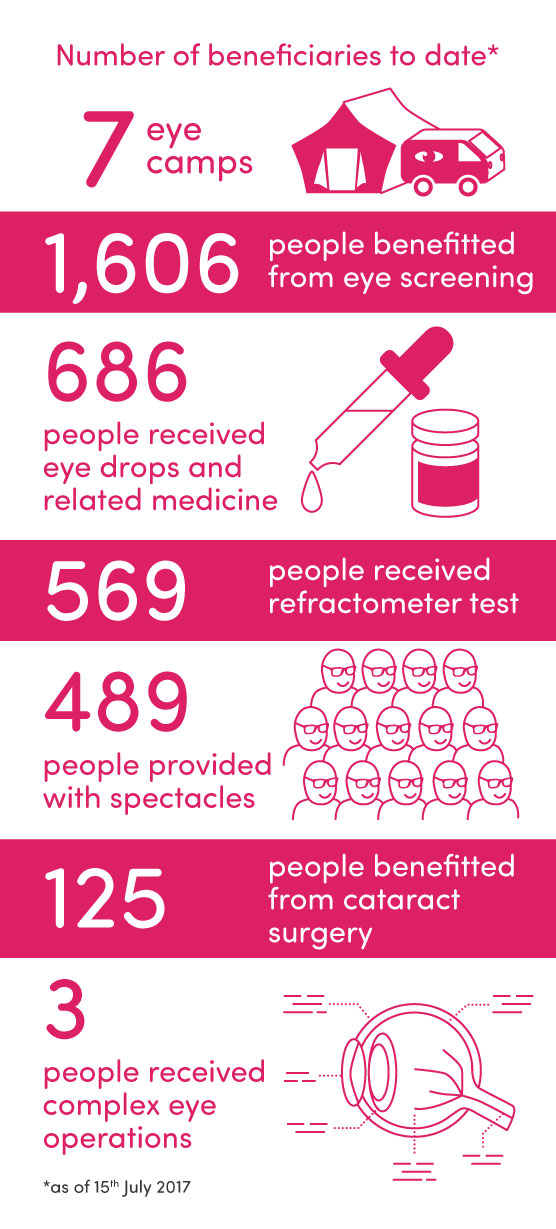
The project has organised free eye care camps in the Netrokana, Bogra, Bagerhat and Pabna districts of Bangladesh, servicing seven upazilas therein. The camps go some way to remedy the innate problem that Bangladesh’s rural areas have, that being, economic insolvency - which results in lack of treatment to those who live outside of urban centres, and a profound lack of awareness of modern eye care services. This can lead to patients seeking out traditional medicine, instead of unknown modern techniques. Another consideration, is that - many people rely on public sector healthcare service delivery, and eye care services are notably absent at upazila level. The project plans to address this situation by providing eye care services for people suffering from refractive error, adult cataract, DCT, DCR and peterygium conditions. The initial phase of this is to raise awareness of the camps and the services they provide. After the treatment takes place, follow up services are provided to those who require it, to complete their treatment and as a further touchstone subsequent to initial screening contact for people in the community.
Figures from the quarterly progress report of the eye care services suggest that palpable impact and effectiveness was achieved, just 3 months into the project. As of 15th July 2017, 1,606 people have benefitted from initial eye screening, 686 people have received eye drops and related ocular medicine, 569 people were provided with refractometer tests, 489 people were provided with spectacles, 125 people benefitted from cataract surgery, with a further 3 people benefitting from DCR and peterygium operations.
Initial feedback reports suggest that a positive image has been created in the communities in which the eye camps operate - as well as leaving an imprint in the local administration’s wider awareness of health care services, and the lacking nature of that provision in Bangladesh. Initial surveys suggest that successfully treated patients are able to increase the income of their families and reduce dependency with their new found vision.
Rahima’s story
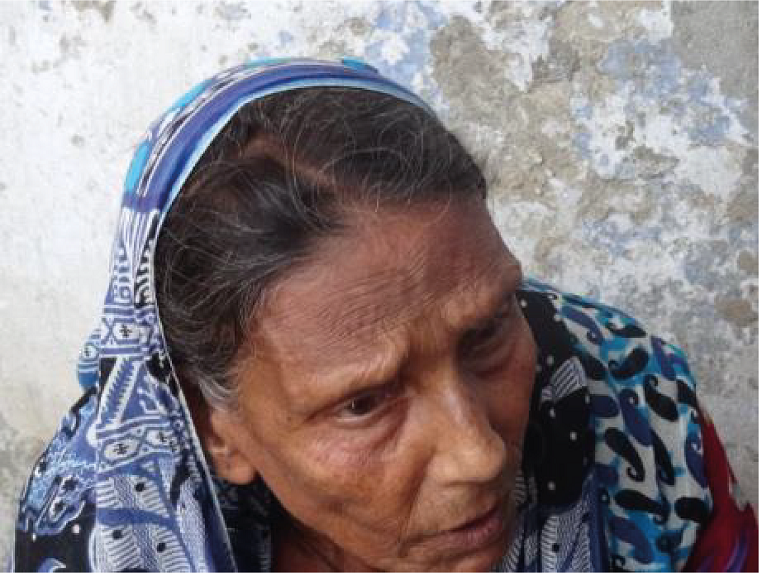
To better understand the human impact free eye care can have on people and communities that live in extreme poverty, with no prior access to established eye care provision - the story of Rahima - a 70-year-old grandmother from the isolated rural village of Sharonkhola is a remarkable example.
Rahima was born into poverty, at an early age both her parents died and shortly after she lost her home due to river erosion, she had to seek refuge in her uncle’s house. Rahima then started work at her neighbour’s residence as a maidservant, after a period of work she was married by her uncle at the age of 11, to a tea stall labourer in a riverside village. Although she hoped marriage would bring about a brighter future, her husband travelled often for work, which meant she was seldom at home.
Then, tragically, her husband and only son died after they contracted fever, Rahima once again became helpless in the world, during this time she adopted an orphan boy from her relatives. As she had no way to provide for her adopted son, she began to beg for both of their survival.
Rahima’s plight began to worsen as she experienced a deterioration in her vision, she explains, “Since a couple of years back, I started to face some problems in my eyes which recently turned into serious problems. I could not beg any more or ask people to help me, as I could not find a way of moving to others.’’
In a distressing time for her family, Rahima’s daughter in law described how her vision became an increasing problem, “After putting boiled rice on her plate, still then she was seeking it and asked me ‘have you put rice on my plate’ and searching for vegetables before they had been placed on the plate. She could not recognize her grandchildren.”
By now Rahima must have thought all hope was lost and that she was destined to die in poverty, until Penny Appeal and its partners reached out, as part of the pre-eye camp screening process and discovered the destitute grandmother crying out in the street. “Oh, Sabuj where are you? Please help me to reach home, I cannot find anything.” It is at this point that a training officer named Toma noticed Rahima’s distress, and called back, “What happened, why you are crying? Mother!” Rahima replied, explaining to him that she could not see anything.
From here on in Rahima’s luck began to change for the better, as Toma arranged for her to visit one of Penny Appeal’s eye camps in Bagerhat’s collegiate school. Following a consultation Rahima was diagnosed with cataracts in both eyes, with surgery scheduled at the nearest hospital. Although she was scared initially, workers from the eye camp convinced her that this was the best course of action, and accompanied her.
Before her operation one of the camp’s staff asked her, “What are your wishes to see first after restoring your sight?” Rahima replied simply that she wanted to see the people who helped to bring her sight back.
As Rahima was transported home, via the eye camp following her operation, she was asked if she could now identify the people who had helped restore her sight, Rahima replied, with an unmistakable smile on her lips, “I pray to God for those who helped return my sight.”
There are many similar stories to be told, people just like Rahima who live in extreme poverty in Bangladesh are now receiving the eye treatment they desperately need. Rahima’s operation cost around £20. The notion that such a small figure can so dramatically transform a person’s life for the better is certainly worth underlining, as is the excellent work all the staff undertake every day in the 7 eye camps Penny Appeal currently organise in Bangladesh.
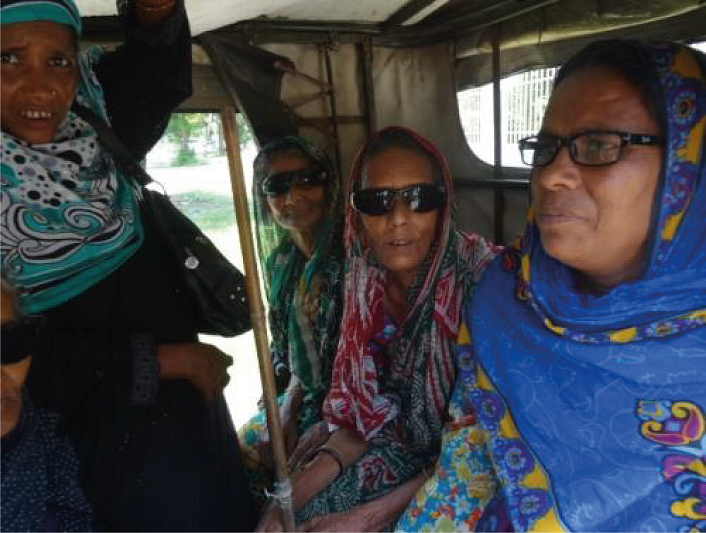
MONDAY 11 SEP 2017
